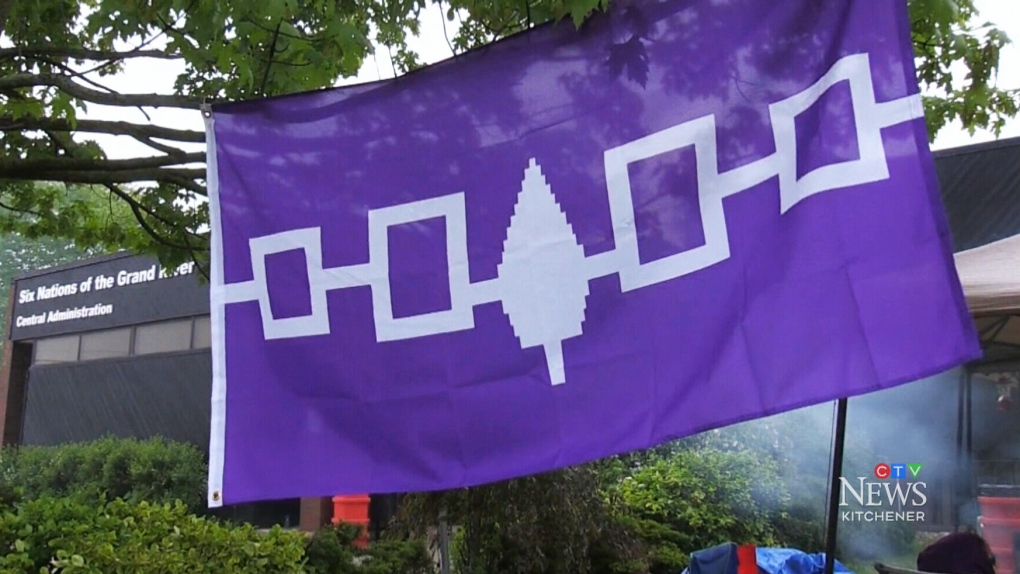Six Nations launches court challenge to extend federal Indian day school class action deadline
 The Six Nations of the Grand River band office appears in a file photo. (File photo/CTV Kitchener)
The Six Nations of the Grand River band office appears in a file photo. (File photo/CTV Kitchener)
Six Nations of the Grand River is calling on the federal government to give survivors of government-run Indian day schools more time to apply for compensation, calling the current deadline and application process unrealistically short, culturally insensitive and retraumatizing.
In a media release Wednesday, Six Nations elected council said they, along with day school survivor Audrey Hill, had filed court documents seeking to extend the deadline to Dec. 31, 2025.
“To this day, a significant number of class members have not yet made a claim because of limited claims assistance, a lack of cultural sensitivity and unfair timelines,” Hill said in the release.
The current deadline to file a claim passed on July 13, 2022, but survivors can request a six-month extension giving them until next month on Jan. 13, 2022.
The agreement claims process opened in January 2020 and Six Nations says the fact that the pandemic hit almost immediately after exacerbated challenges with the short timeline and the plan for notifying and assisting class members.
CLASS ACTION LAWSUIT
Nearly 200,000 Indigenous children attended around 700 federally operated Indian Day Schools, where many endured trauma, including physical and sexual abuse.
Both day schools and residential schools sought to suppress Indigenous culture and language, but unlike residential schools, children who attended day schools were allowed to return home at night and were not included in the 2006 residential school settlement.
Three years later, day school survivors launched their own class action lawsuit. A settlement agreement was reached in 2019. Compensation ranges from $10,000 to $200,000 based on a tiered system depending on harms suffered.
“We know that trauma survivors are often only able to recall or disclose trauma in stages, and most importantly, with time,” Hill said. “Because of the lack of reasonable and culturally sensitive assistance provided, I felt compelled to voluntarily assist others with their claims. It should not have come to this.”
Six Nations of the Grand River Elected Chief Mark Hill says the settlement process has favoured speed and cost efficiency over providing necessary trauma-informed and culturally appropriate assistance.
“The Government of Canada has ignored public statements from First Nations communities noting that their members will be unable to make a claim within the claims period,” said Chief Hill. “It is disheartening that we now must file another motion with the courts to move towards reconciliation.”
In an emailed statement, the federal government said over 177,000 claims have been received as of Nov. 29, 2022, exceeding class size estimates and anticipated take-up rates.
“The abuse of Indigenous children is a tragic and shameful part of Canada’s history. Addressing historical claims related to harms committed against Indigenous children is a crucial step towards strengthening Canada’s relationship with Indigenous peoples,” the government said in part.
“Canada cannot unilaterally amend the claims period deadline, and such questions should be determined by class counsel.”
Help is available for survivors of residential and day schools and their families.
The National Indian Residential School Crisis Line can be reached 24-hours a day, 7-days a week at 1-866-925-4419.
Additional mental-health support and resources for Indigenous people are available here.
CTVNews.ca Top Stories

Calgary woman stranded in Mexico after husband's death during diving trip
A Calgary woman is struggling to return home after her husband died while diving in Mexico, leaving her stranded and facing financial hardship.
CBSA increases travel cost reimbursement fees for 'inadmissible' foreign nationals
Foreign nationals who refuse or are unable to pay their own way home after being denied stay in Canada will soon face steeper financial penalties should they ever attempt to return.
Sea and Himalayan salts recalled in Canada: 'Do not use, serve or distribute'
Two brands of sea and Himalayan salt are being recalled in Canada due to pieces of plastic found in the products.
Liberal caucus chairs meet to talk Trudeau, PM attends Canada-U.S. cabinet committee
Prime Minister Justin Trudeau was back in Ottawa today, but having yet to signal he's ready to address the snowballing resignation calls, the Liberal caucus' regional chairs called a meeting today to discuss next steps.
N.S. community shocked by deaths of father, daughter; suspect was wanted in Toronto shooting
A Nova Scotia community is mourning the loss of two of its members after they were shot and killed in Halifax on New Year’s Eve.
Judge sets Trump's sentencing in hush money case for Jan. 10, but signals no jail time
In an extraordinary turn, a judge Friday set U.S. president-elect Donald Trump's sentencing in his hush money case for Jan. 10, but indicated he wouldn't be jailed.
'Mystery volcano' that erupted and cooled Earth in 1831 has finally been identified
An unknown volcano erupted so explosively in 1831 that it cooled Earth's climate. Now, nearly 200 years later, scientists have identified the 'mystery volcano.'
When do I receive federal benefits this year? Payment dates for 2025
From the Canada Child Benefit to Old Age Security, federal payment dates have been determined for 2025. Find out when you can expect your payments.
Ontario aiming to send out $200 rebate cheques later this month or early February
Ontarians should receive their $200 rebate cheque from the province by the end of January or early February, a government spokesperson confirmed in an email Friday.































